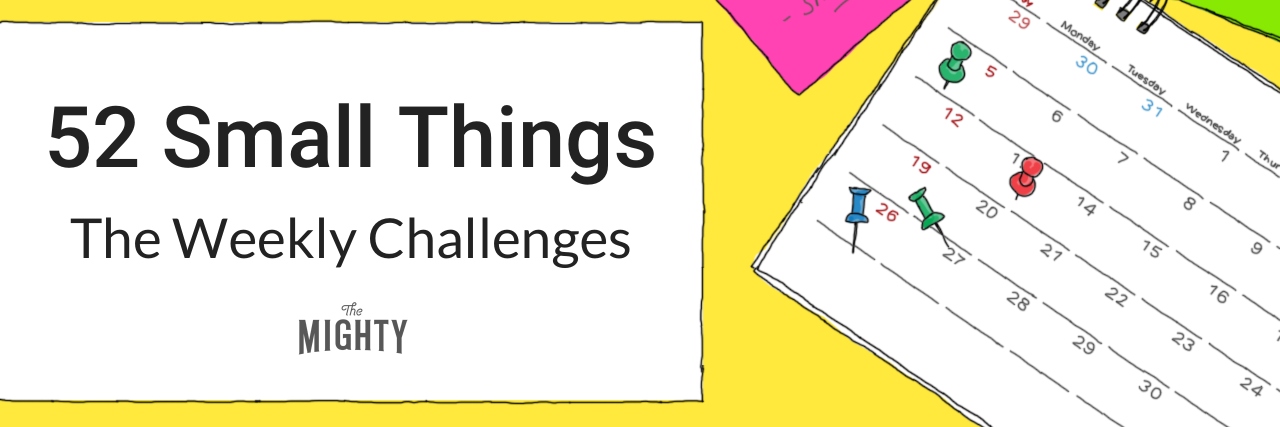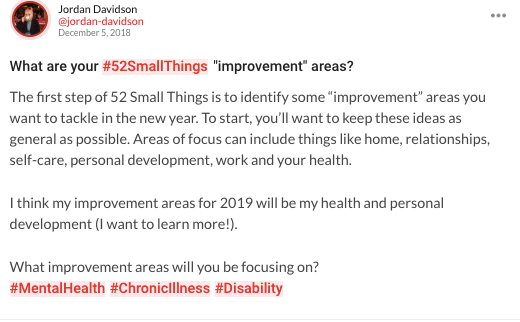52 Small Things is The Mighty’s weekly self-care program. Though we officially started in January, it’s never too late to join. For those just getting started, we recommend checking out our introduction to 52 Small Things as well as our frequently asked questions page before jumping in.
You can make a list of small things you’d like to accomplish this year, or you can follow our 52 Small Things challenge page and use our suggestions. If you don’t like a suggestion, feel free to skip it or come up with your own weekly challenge. You can also re-do a week or go back and do another challenge again.
New challenges are sent out via email every Sunday. Following The Mighty’s 52 Small Things page automatically signs you up for the challenge emails. Not a fan of emails? You can also check this page to see the weekly challenges.
Here are the challenges so far.
Week 1: Identify Your Goals
Click the image above to share your goals for this year with The Mighty community!
We suggest using the first week of the program to make a plan and get yourself set up for success. Whether you are following our suggestions or making your own weekly challenges, identifying your goals will help you prioritize where and how you want to spend your time.
This will mean different things for different people. It might mean organizing your pills in your pill case so you remember to take them or getting a planner to help you stay organized. It could also mean scheduling that doctors appointment you’ve been putting off or downloading a productivity-based app.
If any of these tasks sound like things you need to do, check out these articles:
- 17 Apps That Can Make Life Easier When Brain Fog Takes Over
- 12 Planners That Can Help You Stay Organized When You Are Overwhelmed
- 14 Pill Organizers That Can Help You Keep Track of Your Medications
Week 2: Gratitude
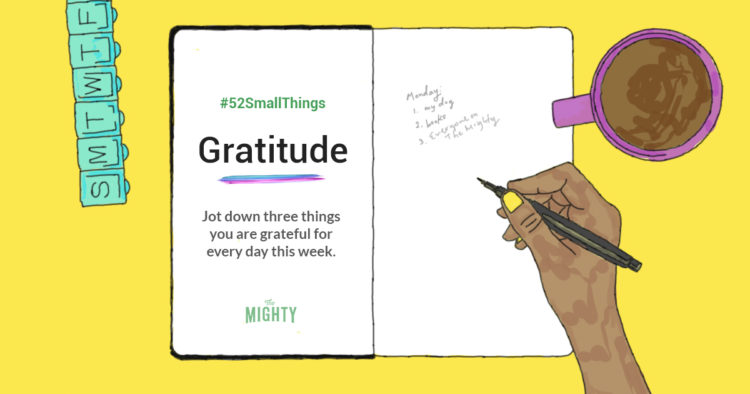
Studies show there are physical and mental health benefits that come with practicing gratitude. Some of these benefits include decreased anxiety, improved sleep, reduced depression, stress relief and help fighting illness.
For those choosing to practice gratitude, write down three things you are grateful for every day this week. You can write them on a piece of paper or share them as a thought on The Mighty.
Want to learn more about the benefits of practicing gratitude? Check out on our article on how to be happier in 30 days.
Week 3: Three-Minute Journaling
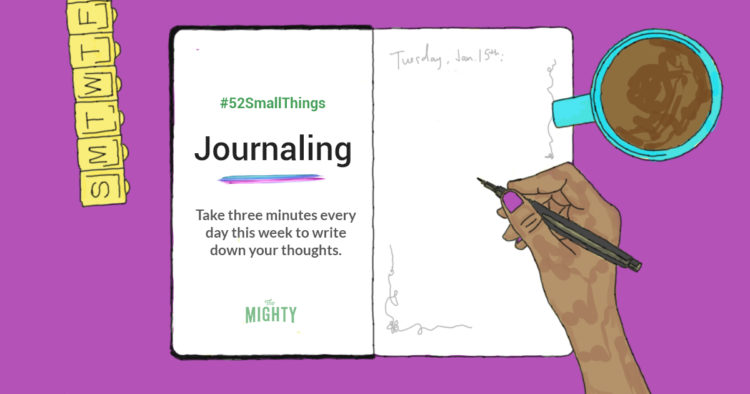
Journaling can help manage anxiety and depression and reduce stress as well as benefit your overall physical health.
This week, take some time to try journaling. We’re challenging you to spend three minutes writing down your thoughts. At the end of the three minutes, you should jot down at least one thing you are grateful for. You don’t need to go out and buy a journal to do this — in fact, it’s probably better to try writing out your thoughts for a week before you make the investment. You can journal as a Thought on The Mighty with the hashtag #52SmallThings, on a random piece of paper, or on your phone — wherever you feel comfortable.
Want to know how journaling has helped others? Here are two articles from Mighty contributors about how journaling helped with anxiety and panic attacks:
Week 4: Staying Hydrated
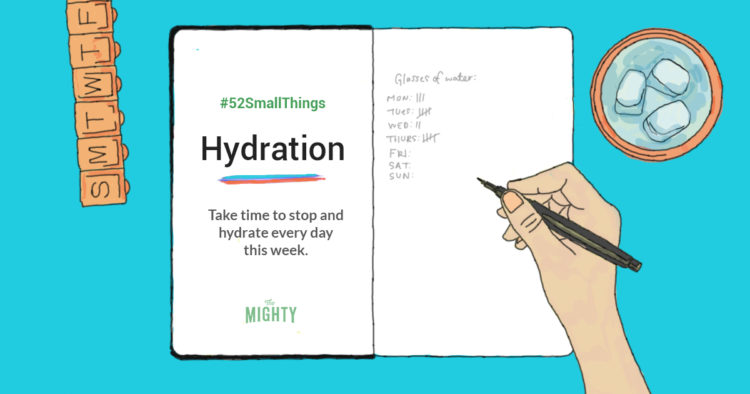
Stay hydrated this week! Dehydration not only affects our physical health but our mental health as well. Studies show that even mild dehydration can impair many aspects of brain function, including our mood, memory and brain performance.
There is no one-size-fits-all amount of water to drink, The standard rule of thumb has been eight glasses per day, but that’s actually a myth. Our bodies are all different. How much you need to drink depends on a number of factors. There are formulas you can use to figure out how much you should be drinking, or you can try drinking eight glasses per day (though that’s often more than most people need). Maybe this week you drink an extra glass of water when you wake up in the morning or grab a piece of fruit to snack on during the day. You know what’s best for your body.
Looking for some hydration inspiration? Check out these tips.
Week 5: Kindness
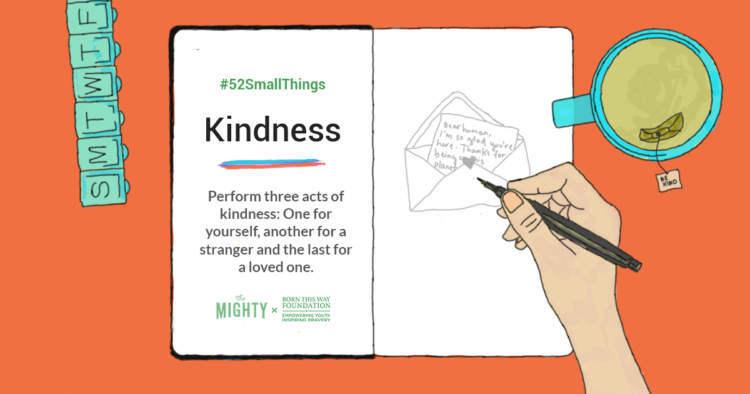
While we might not be able to change the world in one week, we can certainly work on doing small things to start being kinder to our selves and others. Kindness not only increases endorphins, which can help boost your mood and help relieve pain, it’s also contagious! The positive effects of kindness are experienced in the brain of everyone who witnessed the act, improving their mood and making them significantly more likely to “pay it forward.”
If you decide to practice kindness, take this week to perform three acts of kindness: One for yourself, another for a stranger and the last for a loved one.
For tips and suggestions, check out these articles:
- 7 Acts of Kindness You Can Do for Your Chronically Ill Friends
- 8 Small Acts of Kindness You Can Do for Someone in Need
- 16 Simple (but Unforgettable) Acts of Kindness Witnessed in a Hospital
Week 6: Self-Confidence
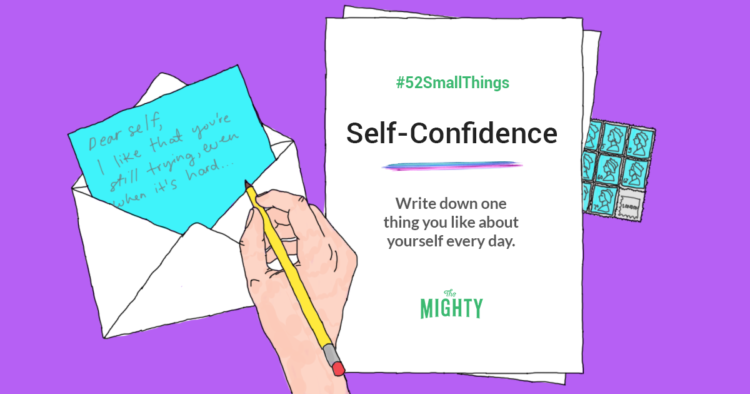
Low self-confidence can increase the risk of mental health problems and can even have an impact on our physical health. The good news is, studies show we can start to rewire our brains to boost our confidence through methods like practicing positive self-talk and shifting our concentration to things that make us feel empowered.
If you’re looking to build self-confidence, try this challenge: Write down one thing you like about yourself every day.
Here are some articles you may relate to if you struggle with low self-confidence:
- 3 Ways to Boost Self-Confidence If Your Weight Has Fluctuated Due to Illness
- How I’m Building My Self-Esteem With Borderline Personality Disorder
- 12 Red Flags You Might Actually Need to Get Help for Your Self-Esteem
Week 7: Expressing Love
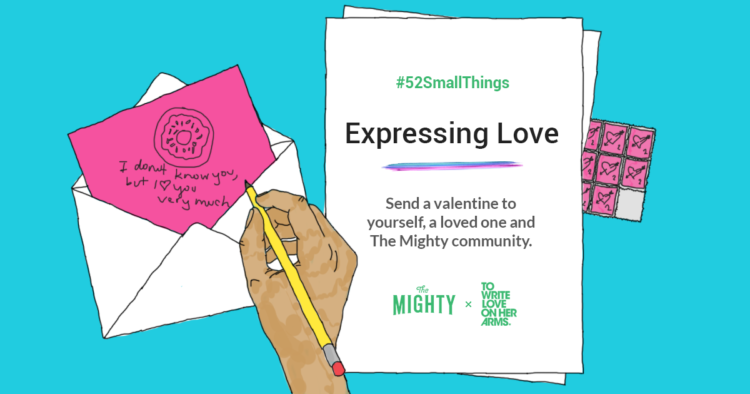
We all know how nice it feels to be loved or appreciated, but it turns out the benefits of expressing love go both ways. By expressing love you can potentially lower your stress hormones, cholesterol, blood pressure and strengthen your immune system.
Spread the love with this challenge. Share three valentines — one to yourself, one to a loved one and one to The Mighty community.
Have a friend who lives with a mental illness? Here are some ways to show them you care.
Week 8: Honoring Your Needs
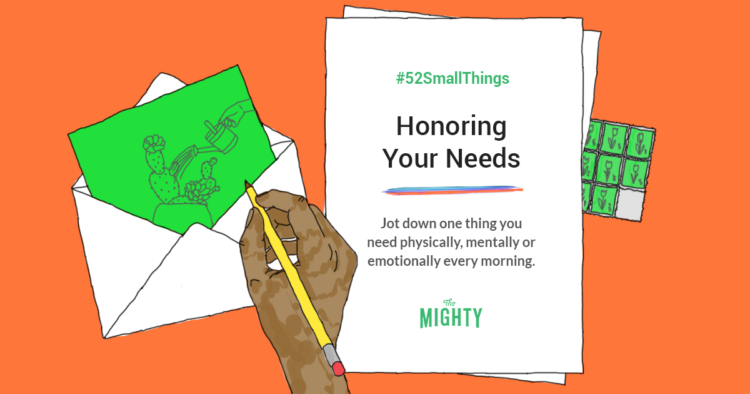
While taking care of others is important and fulfilling, taking care of ourselves is often just as important. Like oxygen on an airplane, you can’t help others until you help yourself. Honoring your needs can not only have a positive impact on your mental health, physical well-being, productivity and happiness, but it can also increase your ability to take care of others.
If you find it difficult to put your needs first, take this challenge. Jot down one thing you need physically, mentally and emotionally every morning. Check in with yourself throughout the day to see if you’ve been meeting your needs or if your needs have changed.
Here are some self-care articles to get your started:
- 101 Self-Care Suggestions for When It All Feels Like Too Much
- 6 Basic and Brutally Honest Ways I Practice Self-Care
Week 9: Connecting With Your Community
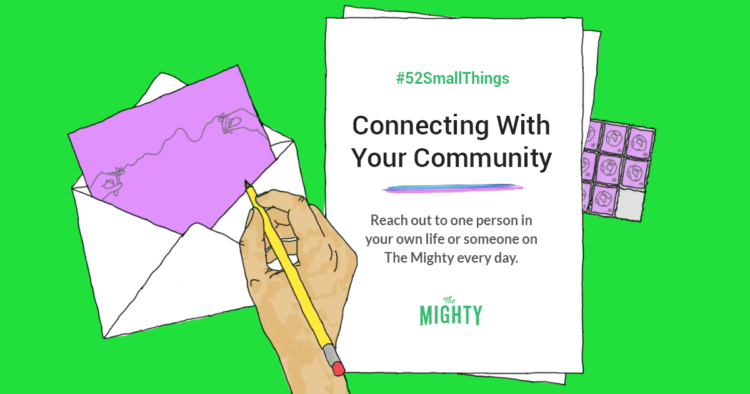
Social support is one of most important factors in improving our physical and mental health and well-being. That’s why connecting with a like-minded community — big or small — can make a difference. If connecting in-person is difficult for you or not an option, online health communities have been shown to provide emotional support, motivation and advice that can help us through whatever health challenges you or a loved one might face.
Take this challenge and reach out to one person in your own life or someone on The Mighty every day. A simple, “How are you?” can benefit both you and others. To give and get support from The Mighty community, you can always #CheckInWithMe at any time.
Week 10: Improving Your Sleep Hygiene
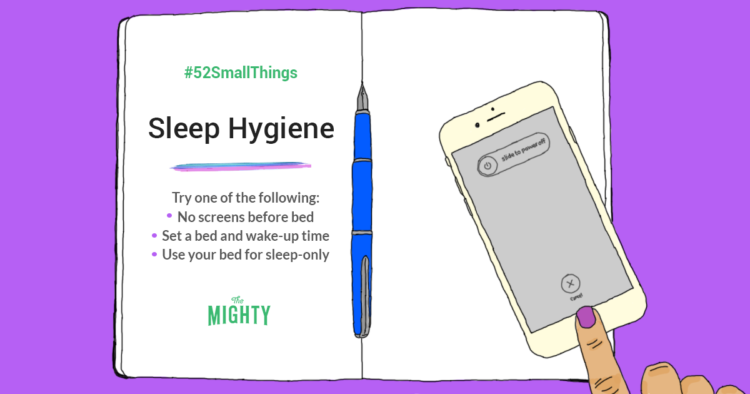
Most experts have concluded that getting enough high-quality sleep may be as important to overall health and well-being as nutrition and exercise.
If your health condition makes it hard to get those high-quality zzz’s, take this challenge to improve your sleep hygiene by doing one of the following: no screens before bed, set a bed and wake-up time or use your bed for sleep-only.
If you have a different way to catch more zzz’s that you’d like to try, you are more than welcome to. These are just our science-backed suggestions! If you want to read more about building positive sleep habits, check out these articles:
- 15 Bedtime Routines You Can Try When Anxiety Makes It Hard to Sleep
- Here’s How Your Sleep Schedule May Be Making Your Mental Health Worse, and What You Can Do
- 16 Products to Use When Painsomnia Keeps You Up at Night
- 6 Things Mighty Editors Tried to Sleep Better
Week 11: Being Creative
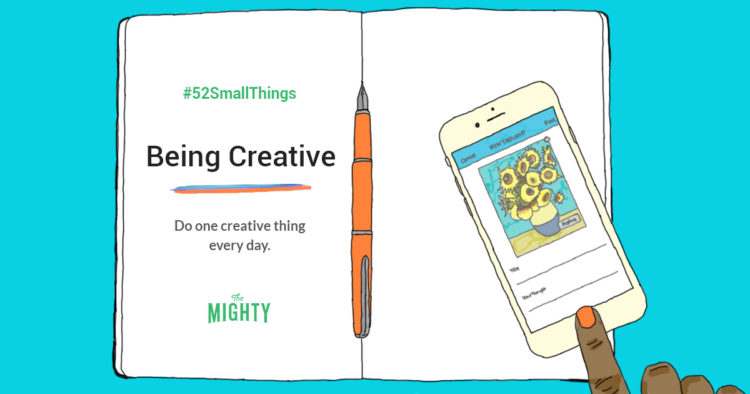
While we might not all consider ourselves “artists,” adding in one just creative activity to your day can significantly lessen stress in the body, regardless of experience or talent. The benefits of artistic expression go beyond relaxation, it can also improve your mental health, confidence and pain levels.
If you’ve lost touch with your creativity or want to be more creative, take this week’s challenge and do one creative thing every day.
Here are a few creative activities to help you get started:
- Photography. Check out the #Photography page for some inspiration!
- Pick up the musical instrument you used to play.
- Write some poetry. Check out our #MightyPoets poetry prompts here!
- Write a personal essay (and submit it to The Mighty!).
- Create some art. Check out the #Art page for some inspiration!
- Craft: scrapbook, make some jewelry or crochet/knit.
- Doodle in a journal, or color in a coloring book.
Week 12: Mood Tracking
![]()
Whether you struggle with mental illness or not, tracking your mood can help you learn more about yourself and overall mental well-being — what makes you feel bad and what makes you feel good. Take this week’s challenge and track your mood every day. You can download this mood tracking template, post on the 52 Small Things page or use an app!
While different forms of mood tracking may work better for every person, here are some articles to help you get started:
- 15 Creative Ways to Track Your Mental Health
- This Mood Tracker Finally Helped Me Understand My Emotions
Week 13: Humor
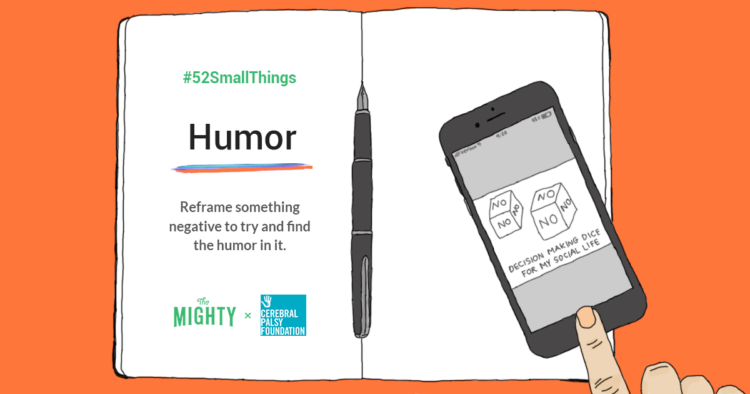
You’ve probably heard the phrase, “Laughter is the best medicine.” While it may not always be the best, it does have physical, mental and social benefits that include: lowering stress hormones, decreasing physical pain, relaxing muscles, easing anxiety and tension, relieving stress, improving mood and strengthening relationships.
Add some laughter to your life by taking this challenge. Reframe something negative to try and find the humor in it — or look for humor in an unexpected place.
Need some instant laughs? Here are some meme articles you might find funny and relatable:
- 18 Memes That Nail What It’s Like to Live With Chronic Illness
- 3o Memes That Might Make You Laugh If You Live With a Mental Illness
- If You’ve Ever Been Told You Don’t ‘Look’ Sick, These 14 Memes Are for You
- Memes That Describe Parents at IEP Meetings
Week 14: Prioritizing
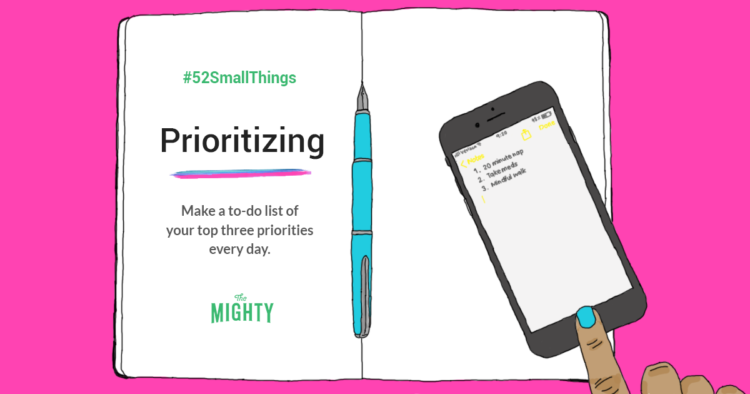
We only have so much time and energy in a day, which can make it hard to balance and prioritize our health, work, finances, relationships, responsibilities and self-care. While we might not get to every task on our to-do list, a recent study found that just making a plan to get those tasks done can lessen our anxiety.
If you have a lot on your plate or find it difficult to prioritize, take this week’s challenge and make a to-do list of your top three priorities every day.
If you’re having trouble motivating yourself to get things on your list done, here are 24 little motivational tricks for getting through a bad mental health day.
If your symptoms make getting things done more difficult, check out these 16 things that can make it easier to get up in the morning if chronic illness makes you exhausted.
Week 15: Mindful Eating
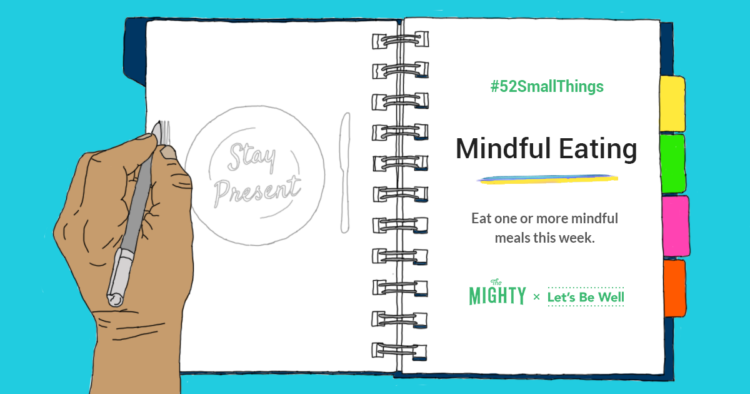
A recent surge of research has found mindfulness to positively impact a wide range of measures of personal health including stress, anxiety and physical well-being — but what about when it comes to food? While we all have a different relationship with food, taking time to notice the colors, smells or flavors of what you’re eating without distractions, or learning to cope with the guilt and anxiety you may experience around food, can have similar benefits.
Take this week’s challenge to gain a better understanding of your relationship with food by eating one or more mindful meals this week.
New to mindfulness? Here are 7 tips for bringing mindfulness into your life.
Week 16: Mental Health Time Out
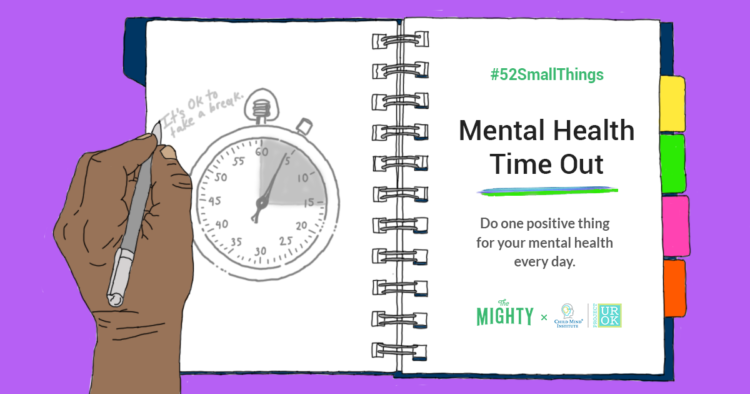
Taking time to rest — even for just two minutes a day — can replenish the brain’s stores of attention and motivation, encourage productivity and creativity, and help us perform and remember better, according to recent research.
If you need a little bit of mental rest and relaxation, take this week’s challenge and do one positive thing for your mental health every day.
Try one of these 101 self-care tips for when it all feels like too much to start.
Week 17: Going Green
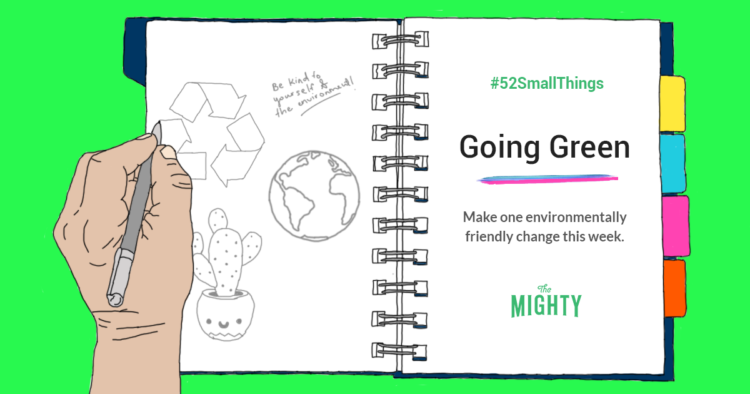
Nature can be healing. Research done in hospitals found that even a simple plant in a room can have a significant impact on stress and anxiety. Nature can also be soothing and restorative — studies show nature helps us cope with pain and improves our mood.
Take this 2-for-1 challenge and make one environmentally friendly change this week, which might also have a positive impact on your own well-being.
Planning to plant something? Here are 10 tips for gardening with an illness or disability.
Choosing to use an environmentally friendly straw? If your disability requires a plastic straw, that’s OK, too!
Week 18: Being Present
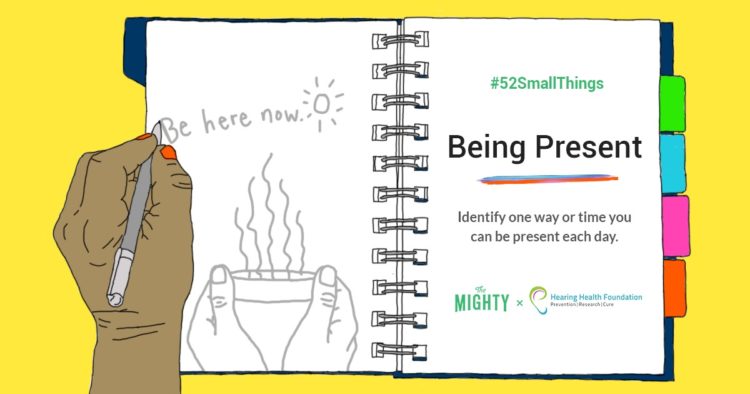
Recent research has found that we spend almost half our lives thinking about something other than what we’re doing. While it may be difficult to “stay present” when you’re experiencing painful or uncomfortable symptoms of a health condition, focusing on being present can help reduce the many side effects of stress that can exacerbate symptoms.
Practice being in the moment by identifying one way or time you can be present each day — whether you’re by yourself or with others.
One way to stay present is by being more mindful. Check out these 7 tips for bringing mindfulness in your life.
Week 19: Dental Hygiene
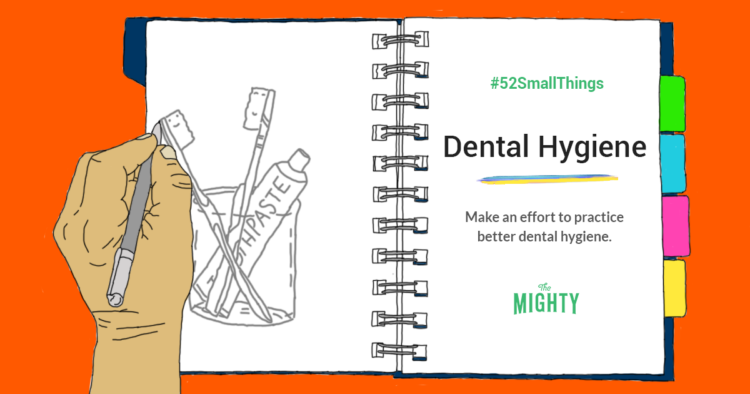
Research shows that your emotional well-being might have an impact on your oral health, and problems that originate in the mouth may be associated with mental disorders like depression.
Take this week’s challenge and make an effort to practice better dental hygiene — floss or brush your teeth more, or make that dentist appointment you’ve been putting off.
If this challenge feels like too big of an ask for you, we’ve broken down some dentist-approved hygiene “hacks” for when you are feeling too depressed or fatigued to prioritize your oral care.
Week 20: Advocating
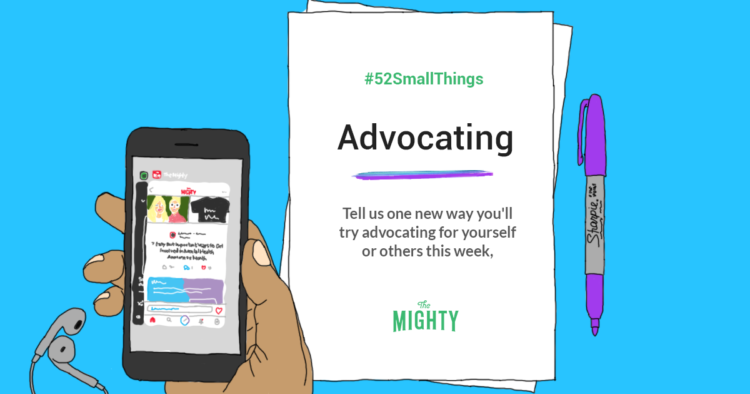
Advocating for your own needs or helping someone fulfill theirs can be more powerful than we might expect. One study shows that advocating can improve confidence and self-esteem. It can also help yourself and others make more informed decisions and receive proper support.
Take this week’s challenge and tell us one new way you’ll try advocating for yourself or others.
In honor of Mental Health Awareness Month, here are 7 easy but important ways to get involved.
Week 21: Celebrating Your Small Victories
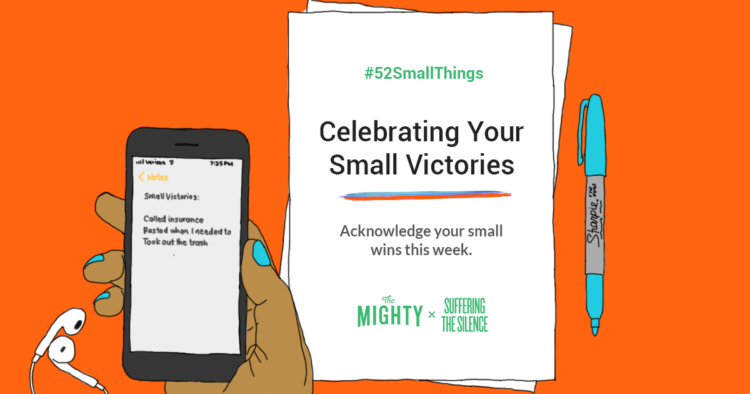
Celebrations don’t have to be grand gestures. Studies have found that celebrating our small wins can bring significant benefits, including improved physical health, better coping strategies and increase in sense of well-being. People who take time to reflect on — and celebrate — their successes are generally more optimistic, take better care of themselves and tend to be less stressed.
Boost your spirits and take this week’s challenge: acknowledge your small wins this week.
Need a place to share your victories with a community who understands their importance? Post to the #CheerMeOn community to celebrate and be celebrated!
Week 22: Going Outside
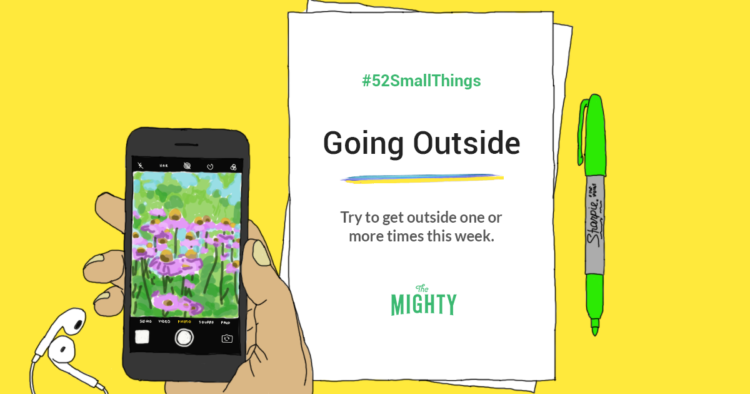
Research has found that being outdoors can lower blood pressure, reduce stress, decrease inflammation, lessen fatigue and have a positive impact on your mental health.
Take this week’s challenge and try to get outside one or more times — even if it’s just going to your car or opening your front door. If you can’t get outside, try looking out your window.
If it’s difficult to leave your house due to your health condition or disability, here’s some inspiration from people who’ve been there:
- The Benefits of Connecting With Nature When Living With a Chronic Illness
- 4 Badass Women Who Prove We Can Be Anxious, Depressed and Adventurous
Week 23: Finding Comfort
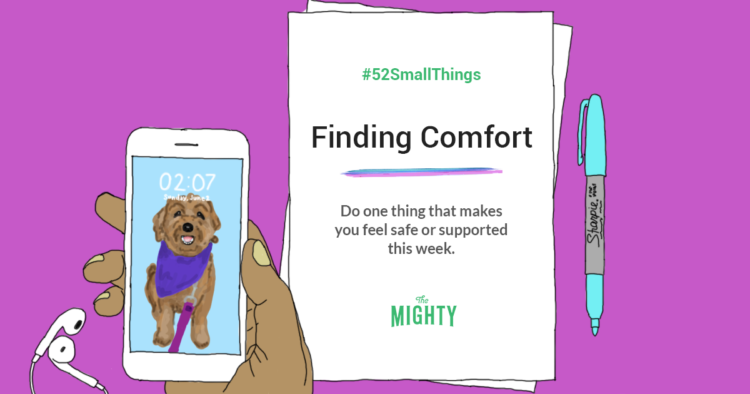
They say it’s important to “step out of your comfort zone.” But sometimes self-care means seeking out a place, person or item that feels cozy in order to recharge. Need proof? Researchers have learned that embracing coziness and life’s little pleasures can improve overall happiness.
Take this week’s challenge if you just need to feel safe or supported. If you don’t know where to start, check out this list of 36 ‘comfort items’ people turn to when they’re struggling with suicidal thoughts.
Week 24: Morning Routine
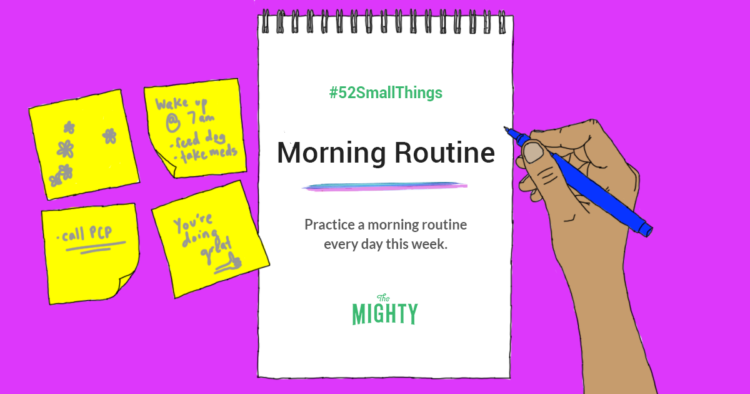
Sticking to a morning routine can be difficult when your health is unpredictable or you’re going through something. But even small changes to your daily habits can help decrease stress and positively impact your mental health.
Take this challenge and practice a morning routine every day this week. Maybe that means remembering to take your meds as soon as you wake up, or you try taking a shower every morning at the same time.
If mornings are difficult for you, check out the “one hour rule” one Mighty member uses when mental illness makes it hard for her to get out of bed in the morning.
Week 25: Creating Positive Spaces
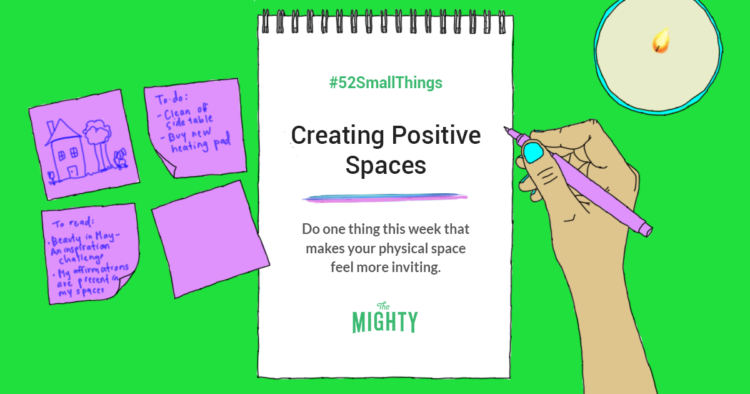
The physical places we spend our time in can affect our mental, physical and emotional well-being. Maybe your workplace feels cold, making it hard to feel productive. Maybe there are rooms in your home that feel cluttered, making it hard to feel relaxed.
If you find that your surroundings impact your health, take this challenge and do one thing this week that makes your physical space feel more inviting.
If cleaning will make your space feel more positive but your health condition limits your ability to clean, these articles are for you:
- 15 ‘Hacks’ to Make Cleaning Easier When You Struggle With Depression
- 26 ‘Hacks’ That Can Make Cleaning Easier If You Have a Chronic Illness
Week 26: Positive Affirmations 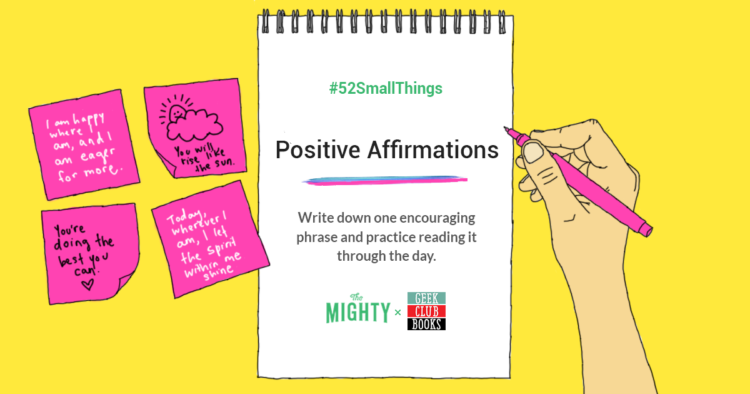
Research has shown that positive affirmations are a critical tool to help maintain a positive self-image, making it harder for threatening situations to affect our mental health. Practicing positive affirmations can also decrease stress, help self-esteem, and even improve school grades.
Take this challenge and change up your self-talk by writing down one encouraging phrase and practice reading it through the day.
Here is one of our favorites from Winnie the Pooh: “You are braver than you believe, stronger than you seem and smarter than your think.”
Positive affirmations don’t have to be big declarations. If crafting positive affirmations is difficult for you, start small. Check out these 12 morning affirmations that can help you slay arthritis (or any health condition) for examples.
Week 27: Try Something New
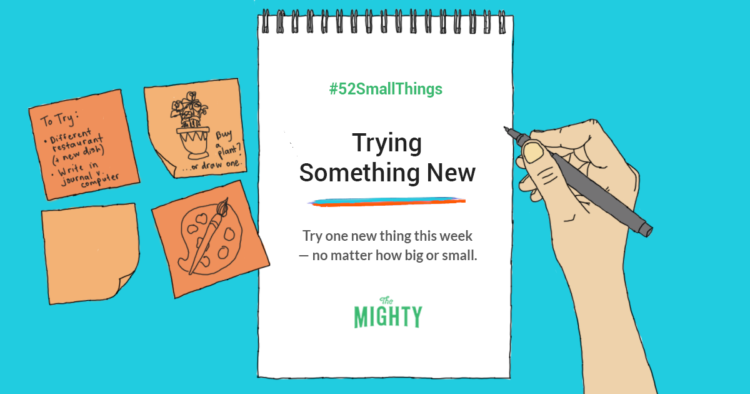
Adjusting to a new diagnosis or navigating a new normal can be difficult, but it doesn’t mean you’ve missed out on the opportunity to discover a new passion. In fact, trying new things has been shown to positively affect the brain by making new neurological connections. More of these connections can help strengthen our thinking skills and protect against cognitive decline.
Take this challenge and try one new thing this week– no matter how big or small. Reconnect with an old friend or post your first Thought or Question in the community.
No matter what you choose, we are here to cheer you on!
For ideas on what to try, check out these articles:
- 25 Things to Do When You are Too Sick to Leave Bed
- How I Survive Social Isolation When My Condition Causes Heat Intolerance
- 5 Things to Do If You Are Bored at Home With Chronic Illness
Week 28: Empathy
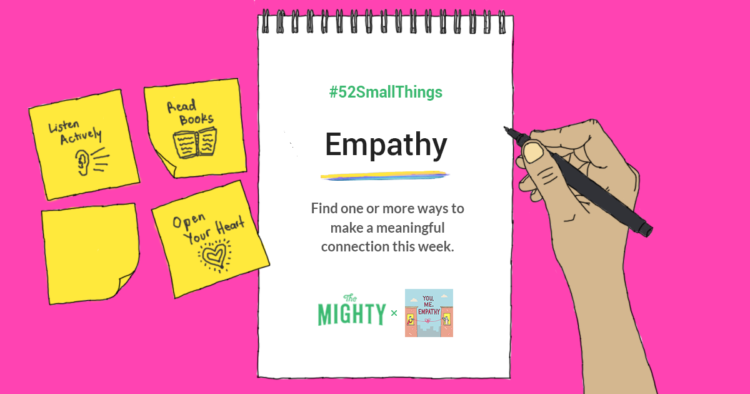
Research shows practicing and receiving empathy can have a profound impact on our wellbeing, both individually and as a society. Practicing empathy can improve your ability to share emotions, needs and experiences with others, which can strengthen social bonds between people. It also can help reduce stress and prevent burn-out.
Take this challenge by finding one or more ways to make a meaningful connection this week. Practicing empathy can be as simple as actively listening to someone else or learning about life experiences different than your own.
If living with an illness has made it difficult to connect with others, check out these articles:
- Why It Is Important to Connect With Others When Living With Chronic Pain
- How to Be Heard When It Feels Like No One Wants to Hear About Your Pain
For more tips on how to practice empathy, try the podcast, You, Me, Empathy by Non Wels.
Week 29: Patience
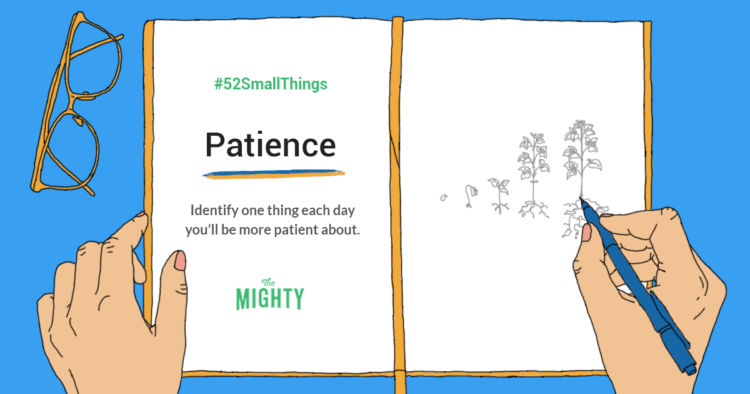
Did you know that being more patient can help you feel less angry or annoyed during stressful situations? Practicing patience can reduce these negative feelings because it can improve compassion (let’s not forget self-compassion, too) and tolerance for stress.
When living with an illness, there are many things we have to be patient about and it can sometimes get overwhelming. If you’ve been feeling inpatient recently, take this challenge and identify one thing each day you’ll be more patient about. It can be something little, like celebrating small achievements or the steps you’ve already taken toward a goal.
If you’re struggling to find ways to practice patience, check out these articles from Mighty members who’ve been there:
- Finding Patience in Moments of Health-Related Anxiety
- How I’m Learning to Manage Stress as Someone With Chronic Illness
Week 30: Setting Boundaries
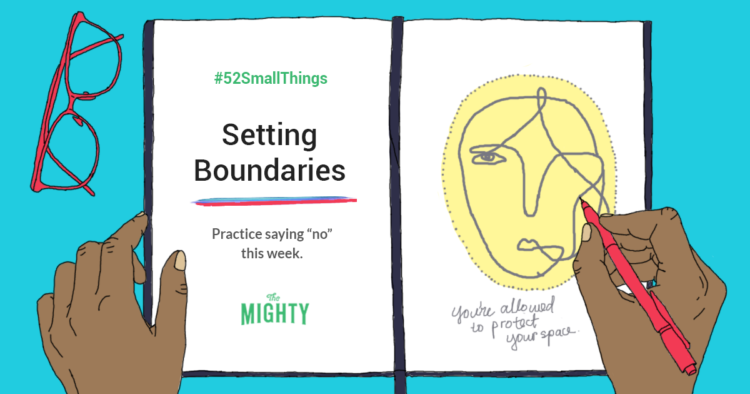
Making space for yourself — both physically and emotionally — can improve your mental health by helping you maintain a positive self-concept. Setting boundaries may sometimes seem “selfish” or “harsh,” but it’s a practice that can help you better understand your own needs and cultivate trust in yourself.
Setting boundaries isn’t always easy. That’s why this challenge focuses on the basics of setting boundaries: Practice saying “no” this week.
If you struggle with setting boundaries, here are some tips from your fellow Mighties:
- How to Set Boundaries to Protect Your Mental Health
- How to Have Boundaries With Someone Who Doesn’t Respect Your Boundaries
- 16 ‘Small,’ but Significant, Boundaries People Made With an Abusive Parent
Week 31: Facing Your Fears
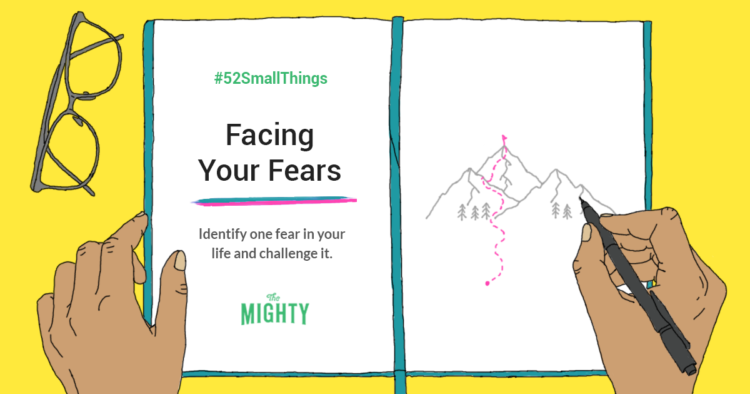
Facing your fears can be scary — so why complete this challenge? Facing your fears in doses you can handle without getting completely overwhelmed can change your brain’s physiology, making that fear and the anxiety associated with it easier to manage.
Take time to identify one fear in your life and challenge it. This doesn’t mean you have to go skydiving — it can be something small, like doing something you’ve been putting off.
If facing your fears feels overwhelming, here are some stories from Mighties who’ve been there:
- Facing My Fears as a Person With Invisible Disabilities
- 15 Common Types of Fear People With Chronic Illness Experience (and How to Cope)
- 43 People With Anxiety Share Their Biggest Fears
Week 32: Distraction
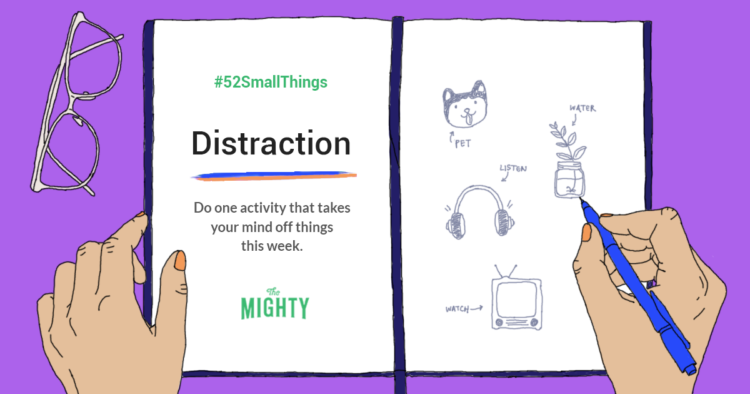
People often think distractions are something to be avoided — like a bad habit. When living with a health condition or disability, however, having a distraction can sometimes be a good thing. Doing something to distract you — like playing games, listening to music and even exercising — allows your brain to focus on something else and can reduce pain, anxiety and ease addiction urges.
Take this challenge if you need a break from stress by doing one activity that takes your mind off things this week.
If you ever need to take your mind off what you’re going through, post using the hashtag #DistractMe. Or check out the #DistractMe page for inspiration and ideas!
- How Distraction Can Help You With Depression and Anxiety
- Ready, Set, Distraction: Distracting My Mind From My Chronic Illness
Week 33: Building Emotional Strength
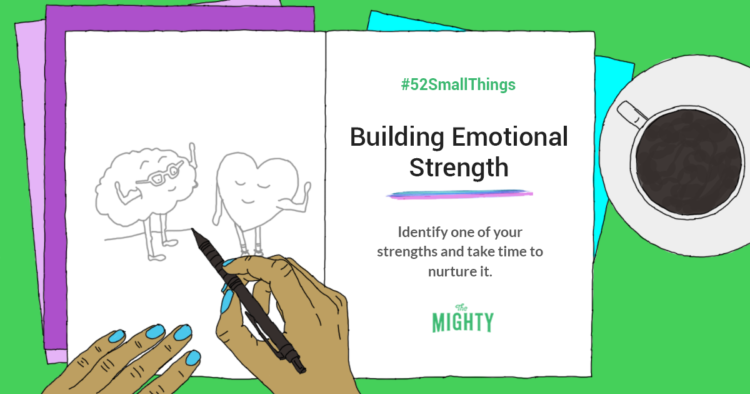
People often talk about the importance of external strength, but what about inner strength? Cultivating emotional strength can help you handle stress and bounce back from setbacks easier.
Flex those mental and emotional muscles, and identify one of your strengths and take time to nurture it.
If you’re having trouble figuring out what your strengths are, read these stories from contributors who’ve been there:
- People With Anxiety Are Hiding These 24 Strengths
- How I Found My Strength After My Borderline Personality Disorder Diagnosis
- How I Found My Inner Strength After My Life Unexpectedly Changed
- When You Fight to Feel Strong While Living With Chronic Illness
Week 34: Prevent Burnout
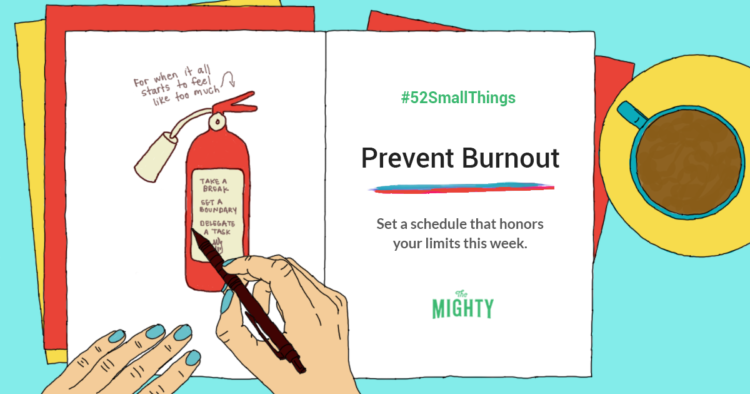
Experiencing burnout can actually cause adverse reactions on one’s physical self, and extends far beyond our professional lives.
Lighten your load by honoring your limits with breaks, boundaries and delegating.
If you need some inspiration on where to start, check out these contributor stories:
- My Limitations Are a Badge of Honor, Not A Mark Against Me
- Tips For Sticking to a Schedule When You Have Fibromyalgia
- When You Need to Step Away From Mental Health Advocacy for Your Mental Health
Week 35: Writing Letters

There is something special about opening up your mailbox to find a handwritten letter. Aside from the feel-good factor, studies show that the act of letter writing actually has the power to heal. Even a quick thank you note can boost your mood.
If you’re itching to reconnect with someone in your life, try putting pen to paper with this week’s challenge by writing a letter to yourself or others. Want to go the extra mile? Try adding a personal touch like a photograph or drawing.
At a loss for words? Here are a few reminders from the community that emphasize it’s not so much about finding the “right” thing to say, but rather the thought that matters the most.
- To Myself, When Recovery From Depression is ‘Sink or Swim’
- Dear Body, It’s OK for You Not to Be OK
- What to Say to a Friend With Depression When You’re at a Loss for Words
Week 36: Finances
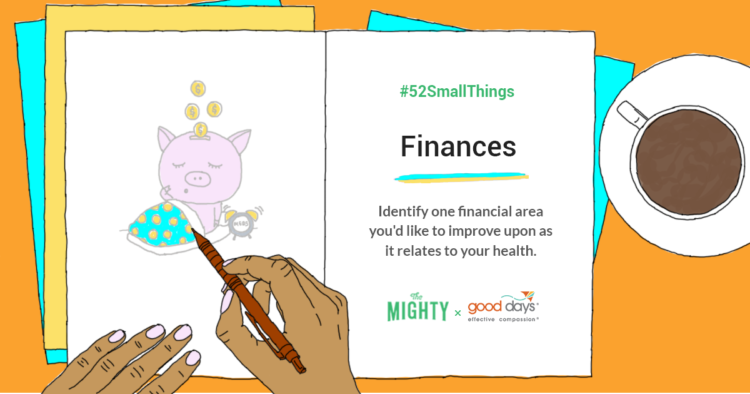
Did you know that 90% of the nation’s $3.3 trillion in annual health care costs are for people with chronic and mental conditions? It comes of little to no surprise for those who struggle with illness or disability of any kind, that it’s expensive to be sick. In fact, one in four Americans delay medical treatment because they can’t afford it.
If you’re feeling lost in the money maze that is managing your health-related finances, this week’s challenge is for you. Learn more about creating a budget as well as navigating insurance costs and premiums.
Here are a few stories from Mighty members who get it:
- We Need to Talk About the Financial Impact of Being a Spoonie
- The Extra Money We Have to Spend to Get Through a Day With Chronic Illness
- 5 Tips for Managing Money While You’re Recovering From Addiction
Week 37: Music
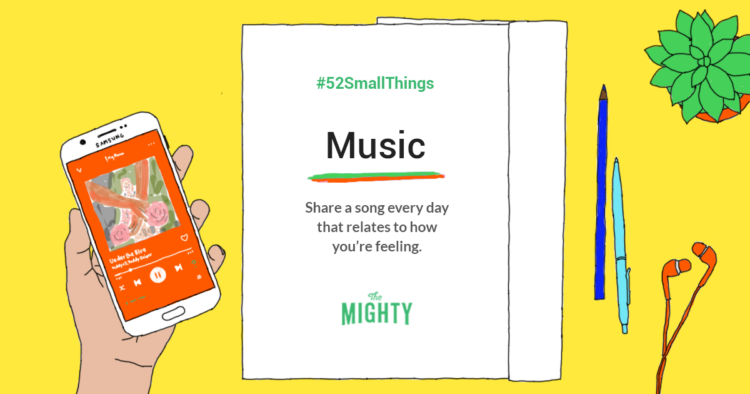
The best thing about music is that there is a little something for everyone. In fact, research shows there is more to music than just providing quality ear candy — it actually has healing properties. From treating chronic pain to diffusing stress, listening to music (which is rooted in healing vibration) can actually make you a little more whole.
If you’re in a need of a new track (or two) that fits your mood, discover new tunes in this week’s self-care challenge.
Here are a few catchy places to start:
- 25 Songs That Have Helped People Living With a Mental Illness
- 18 Songs That Were Written About Chronic Illness
- The Sound of My Grief: How Music Helps Me Heal
Week 38: Making Changes
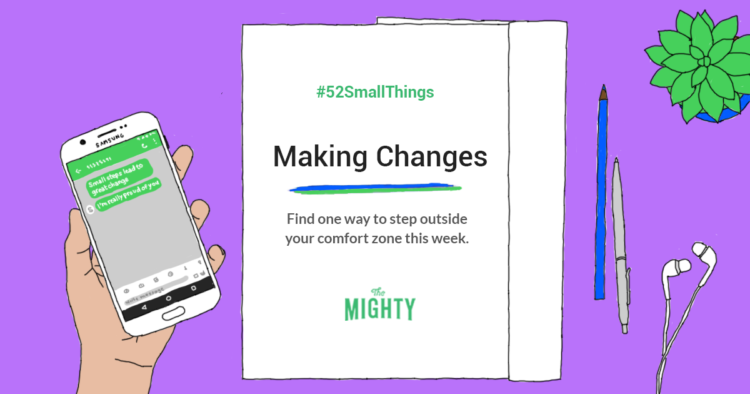
You’re not alone if you find it easier (and safer) to stay inside your comfort zone than to step out of it. But there are a variety of benefits when you give it a try. By exploring new terrain, you open up the possibility to learn more about yourself, expand your skillset or even deepen your capacity to deal with inevitable life changes.
This week’s challenge is meant to be a small step in the direction of change (think: five-minute tasks). Who knows, you may even unlock a new level of hope in yourself and your future. You got this!
Here are two Mighty stories about embracing change:
- What Getting Out of Your ‘Comfort Zone’ Means With Chronic Illness
- When I Need to Leave My Comfort Zone as an Autistic Person
Week 39: Accepting Differences
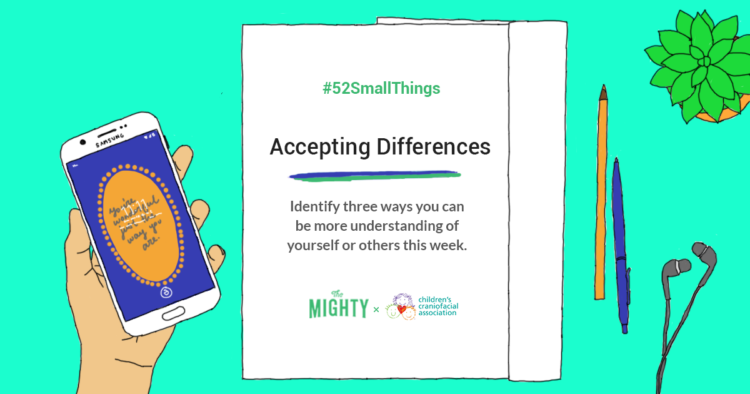
It’s normal to want things or people to be different — including ourselves. But history shows that when we hold tightly onto that dislike or hate or annoyance, we walk a very fine line with emotions like rage and distrust. Understanding and accepting differences has a myriad of benefits. You can feel more at peace, improve relationships and make space for less judgment or irritability.
That’s why this week’s challenge is all about identifying ways you can be more accepting of yourself and others.
Here are three contributor stories about the power of acceptance when you live with a health condition or disability:
- Learning to Accept Myself With Mental Illness
- When My Father Finally Accepted My Autism Diagnosis
- Why I Believe ‘Radical Acceptance’ Is Important With Chronic Illness
Week 40: Storytelling
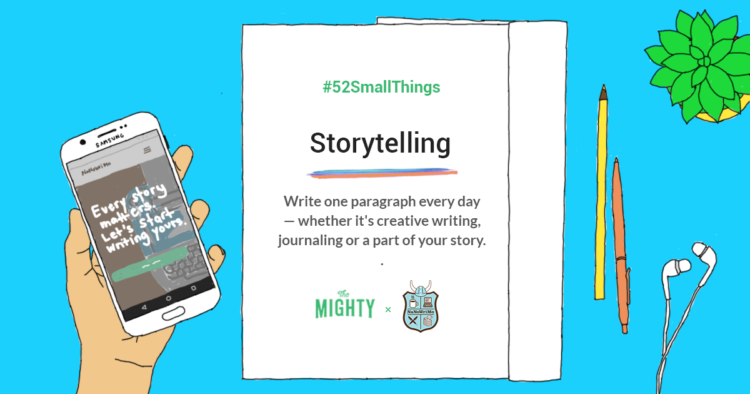
There are two types of stories we tell — the ones we need to and the ones we want to. Aside from providing an avenue for self-expression, research shows that storytelling can actually lower depression and pain. Putting pen to paper (or fingers to keys) can also help us process traumatic experiences.
To get you started, here are three stories from Mighties who find comfort and benefit in narratives:
- The Unexpected Effect Journaling Had on My Anxiety
- 4 Ways Writing Can Be a Form of Self-Care for Chronic Illness
- How Writing is Helping Me Through Depression
Week 41: Rest
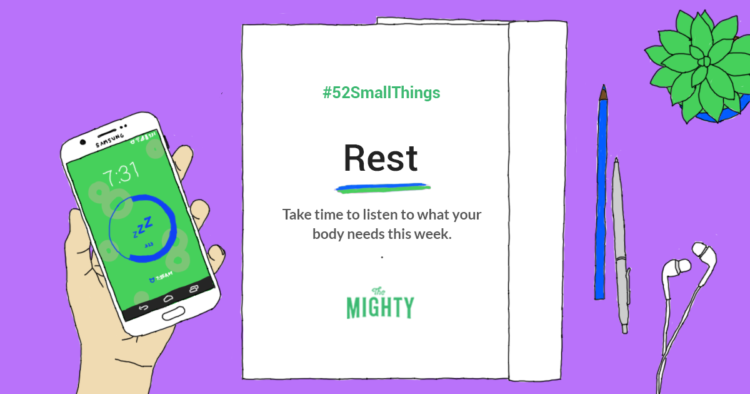
“You should rest more.” Sound familiar? As easy as the concept sounds, it can be difficult to set aside dedicated time for intentional stillness in a life full of commitments. But rest is essential not just for our physical health but also for our mental health — as exhaustion can lead to worsening depression and reduced immune system functioning.
For this week’s challenge, let’s tap into what your body really needs.
Here are three Mighty stories about what it means to rest when you live with a health condition (plus, a few tips about catching some Z’s):
- Here’s How Your Sleep Schedule May Be Making Your Mental Health Worse, and What You Can Do
- 6 Things I Do on ‘Days of Rest’ With Depression
- The Difference Between ‘Rest’ and ‘Bad’ Days for My Chronic Illness
Week 42: Movement
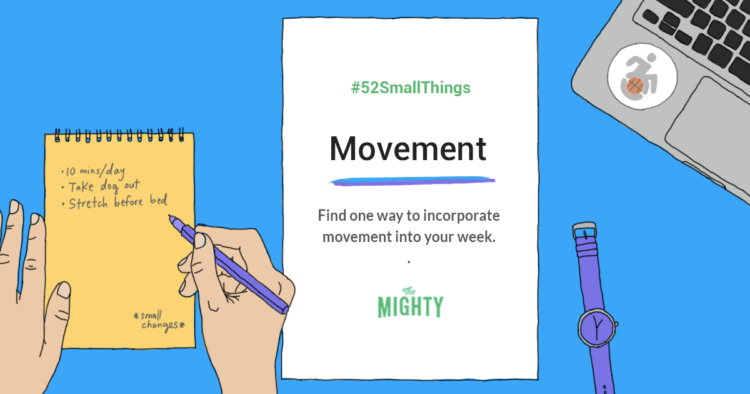
It’s a common occurrence for people that live with a health condition or disability to hear the words, “But what if you exercised?” Admittedly, movement isn’t a cure-all. But there is substantial research that shows why small changes in how we engage our bodies can benefit our mental and physical health, like calming down your brain’s “fight or flight” response or boosting your mood.
Movement can look as simple as stretching before you crawl back into bed or a ten-minute walk with your pup. This week’s challenge is about starting small (or finding the motivation to begin at all).
If you’re feeling up to it, here are three stories about how to incorporate more movement into your routine:
- How to Exercise on a Bad Mental Health Day
- 5 Reasons Why I Enjoy Working Out as a Young Woman With Chronic Conditions
- Easy and Realistic Home Exercises for People With a Physical Disability
Week 43: Meditation
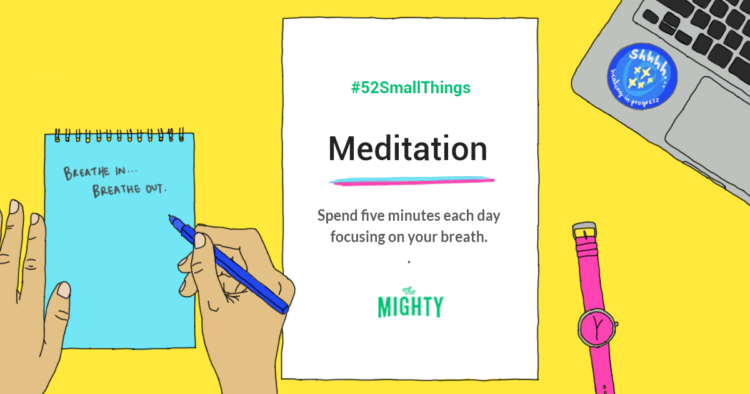
Breathing is the literal foundation to existing as a living being. But aside from surviving, research shows that if we intentionally focus on our breath in the form of mediation, we have the power to reduce rumination and stress, boost our working memory, lessen our emotion reactivity and possibly increase our immune function.
This week’s challenge is all about finding a quiet place with little distraction so you can better focus on your inhales and exhales. Feel a thought passing through? Acknowledge it and then let it go, and get back to your breath.
Here are a few stories from fellow Mighties about their experience with practicing mindfulness:
- How I Finally Understood Why I Need to Learn Mindfulness
- How Tapping into My ‘Inner-Buddha’ Helps Me Through Health Crises
- How Learning the ‘Art of Sitting’ Helps Me Cope With Illness
Week 44: Trick or Treat Yo’Self
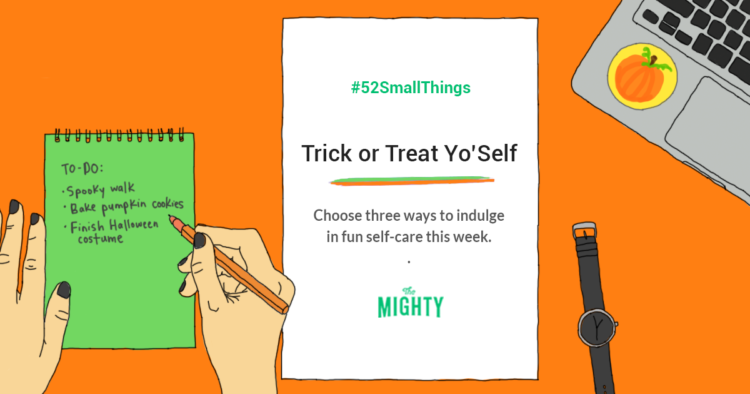
Trick or treat. You’ve heard that phrase many times before, and you’ll probably hear it a lot more before Halloween night winds to a close. But odds are, it doesn’t take a parade of brightly dressed trick-or-treaters to bring out your giving side. Treating others is something you do all the time — for your family, your friends, your coworkers. But how often do you show yourself that same love?
For many people, self-care doesn’t come easily. Some may feel selfish taking time for themselves. But showing yourself kindness can go a long way toward increasing your physical and mental resources to deal with stressors (which can be especially important if you’re living with a physical or mental health condition).
Take this challenge at any time (even after Halloween ends) and choose three ways to indulge in self-care. Do something that you love or makes you feel good, because you deserve it.
Need some self-care suggestions? Check out these tips:
- 7 Reflections on My Journey to Decrease Depression and Be Kinder to Myself
- 5 Ways to Treat Yourself on a Difficult Day With Chronic Illness
- It’s OK to Take Time for Yourself If You Can’t Give 100%
Week 45: Listening to Your True Self
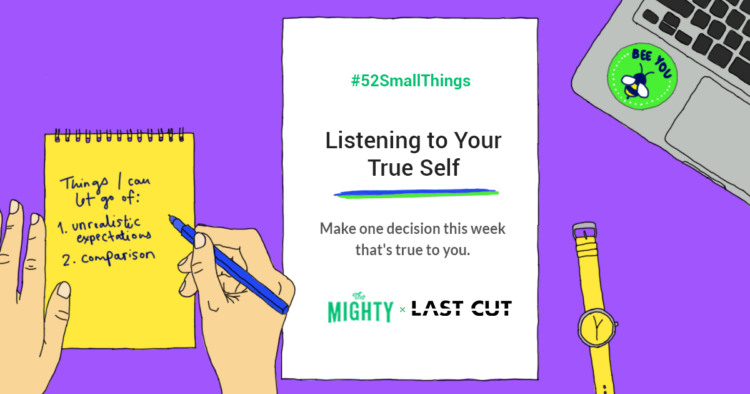
Decisions can be difficult — whether they’re as big as a medication change or as small as choosing what to do on a wide-open Saturday afternoon. It can be tempting to relieve that pressure and defer to the judgment of others.
But you know your needs better than anyone. Making choices that feel right to you can go a long way toward making you feel happy and at peace with yourself.
Take this challenge and make one decision that feels true to yourself.
Looking for a place to start? Check out the LAST CUT project for inspiration on authentic decision-making. Or read these pieces from our Mighty contributors:
- When Fibromyalgia Is a Series of Decisions
- When Self-Care Means Saying ‘No’
- Why Making Decisions Can Be Daunting When You Don’t Have Your Health
Week 46: Setting Goals
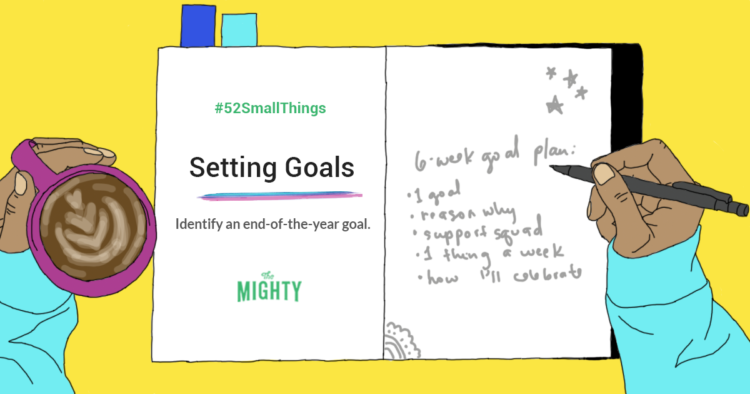
It can be stressful to set goals for yourself, especially when your health makes achieving those goals more challenging. But research shows that setting goals can help to improve your well-being and give you tools to be happier in your day-to-day life.
Take this challenge and identify a goal you’d like to achieve. If writing things down helps you, download this 6-week goal plan.
Remember that small steps can lead to big changes. And most importantly, know we’re rooting for you along the way.
Starting is often the hardest part. If you need some motivation, these stories from Mighty contributors are for you:
- 6 Steps to Achieving Your Goals With Chronic Illness
- 5 Mental Health Goals to Incorporate Into the New Year
- 4 Ways I’m Achieving My Goals Despite Chronic Illness and Pain
Week 47: Cleaning
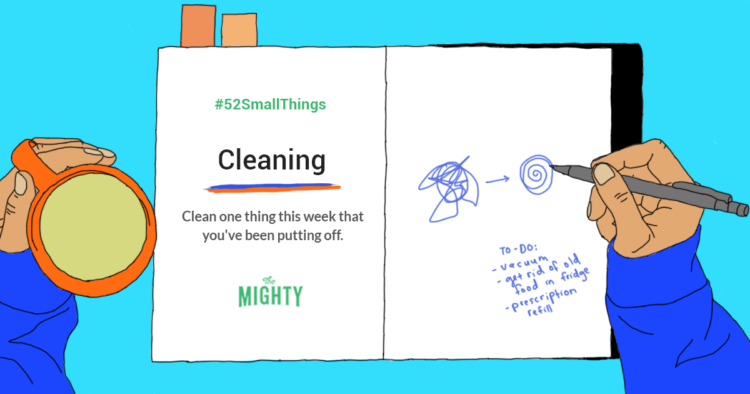
If you hate cleaning, we can’t blame you. Your energy and time are precious when you live with a chronic health condition. There are a thousand ways you could pass the time on days when your physical limits are softened for a while. Why spend that time doing chores?
But cleaning doesn’t have to be time-consuming or stressful. There are little things you can do every day to make your home a little bit tidier — and research shows that living in a clean environment has significant health benefits.
Take this challenge and clean one thing that you’ve been putting off.
Need some inspiration? Check out these articles for ideas on how to keep your space clean while living with a chronic condition:
- 24 Products That Can Make Cleaning Easier If You Have a Chronic Illness or Disability
- 26 ‘Hacks’ That Can Make Cleaning Easier If You Have a Chronic Illness
- The 2-Minute Rule I Use When I’m Too Depressed to Clean the Kitchen
Week 48: Saying Thank You
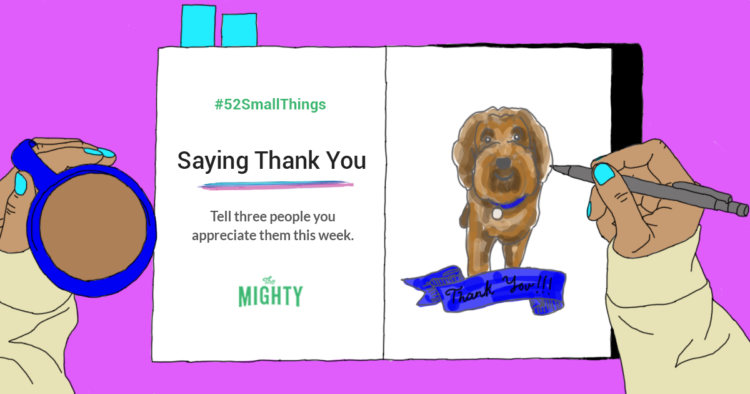
What if we took the time to thank the people who do so much for us? The barista at your favorite coffee shop who always remembers your favorite order. The neighbor who smiles at you as you’re picking up the mail. Your best friend, whose voice on the other end of the phone is a constant when your health is unpredictable.
Taking a few minutes each day to express our appreciation can change someone’s day for the better — and studies show that expressing gratitude makes us happier, too.
Take this challenge and send someone a “thank you” — whether it’s a message, card or in-person.
Not sure where to start? Check out these Mighty stories about expressing gratitude:
- To My Friends: Thank You for Loving Me Through My Illness
- To the Cashier Who Realized I Was Having a Panic Attack
- The Village It Takes to Keep a Chronically Ill Woman Going
Week 49: Unplug
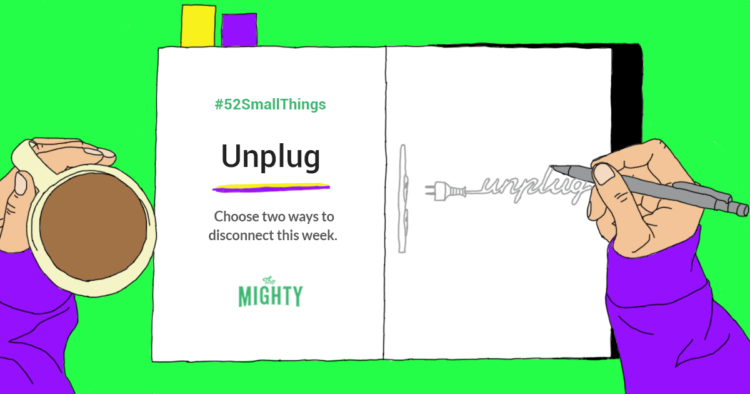
Smartphones and social media make it easier to connect with loved ones and find others who relate to your interests and challenges. Technology can also make the world much more accessible for people with health conditions or disabilities.
However, research has shown that excessive screen time can be bad for your health. Does social media cause you stress? Do you find yourself reaching for your phone whenever there’s a quiet moment?
Take this challenge and find two ways to disconnect.
Looking for inspiration? Here’s what happened when other Mighties “disconnected”:
- How Learning to ‘Unplug’ Helped Me Cope With Chronic Illness
- Why I Decided to ‘Unplug’ My Kids
- 17 ‘Small,’ but Significant, Lifestyle Changes That Help People With Anxiety
Week 50: Identify Your Emotions
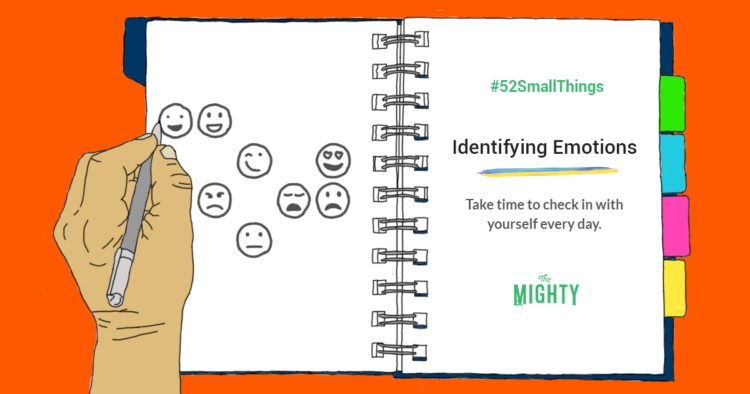
Some people feel detached from their feelings. For others, life can be an emotional roller coaster. Whether you feel everything strongly or struggle to get in touch with your emotions, learning to identify your feelings can be an enormous help. Studies have shown that emotional differentiation can improve your well-being and help you cope with stress.
Take this week’s challenge and find time to check in with yourself every day.
Wondering where to start? Read these articles to get tips from Mighties who have been there.
- The ‘Emotion Chart’ My Therapist Gave Me That I Didn’t Know I Needed
- 8 Reasons You Might Be Feeling Emotionally ‘Numb’
- When Borderline Personality Disorder Makes It Hard to Identify Your Emotions
Week 51: Coziness
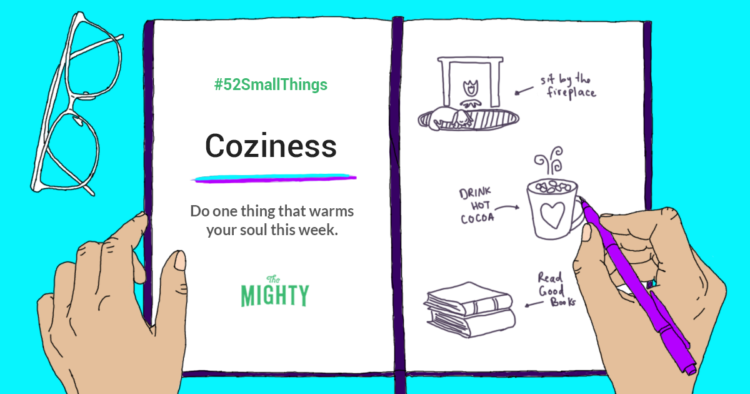
When you live with a health condition or disability, it can be harder to achieve a true sense of comfort — physically, emotionally or mentally. But even when your health is unpredictable, there are little things you can do to lend your days and spaces an abiding sense of warmth.
Research suggests that cultivating “coziness” can make us happier and lead to more harmonious interactions with others.
Take this challenge and do something that warms your soul. Grab a thick blanket, treat yourself to a cup of hot chocolate or read a book that makes you lose all sense of time.
Wondering where to start? Here’s how other Mighties brought coziness into their lives:
- How Hygge Helps Me Manage My Chronic Illness
- How I Approach Self-Care as Someone With a Chronic Illness
- Fibromyalgia and Winter Blues: Finding Your ‘Hygge’
Week 52: Honor Your Progress
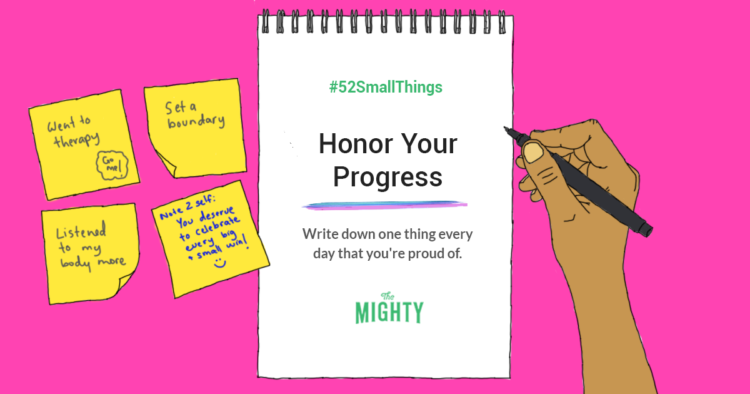
When you live with a health condition or disability, it can feel as though time is standing still. Some of the things you may have wanted for yourself — a career, a family, a degree — may seem out of reach. But just because your journey doesn’t look like other people’s doesn’t mean you’re not making progress. You’re still growing in ways others can’t always see — growing on the inside, building the strength you need to keep going.
Research suggests that taking the time to celebrate your wins can improve your physical health and reduce your stress. Take this challenge and write down one thing you’re proud of every day. No matter what your progress looks like, it’s real, it’s important and it deserves recognition.
Need a reminder of all the big and small victories worth celebrating? Check out these Mighty stories:
- 19 ‘Little Victories’ People With Chronic Illnesses Celebrate
- 15 Mental Health Victories Worth Celebrating
- Learning to Celebrate the Small Victories After Becoming Disabled

